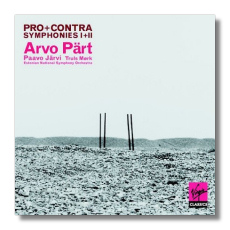
The Internet's Premier Classical Music Source
Related Links
- Pärt Reviews
- Latest Reviews
- More Reviews
-
By Composer
-
Collections
DVD & Blu-ray
Books
Concert Reviews
Articles/Interviews
Software
Audio
Search Amazon
Recommended Links
Site News
 CD Review
CD Review
Arvo Pärt

- Pro et contra - Concerto for Cello
- Symphony #1 "Polyphonic"
- Symphony #2
- Collage über B.A.C.H.
- Perpetuum Mobile
- Meie aed
Truls Mørk, cello
Ellerhein Girls' Choir
Estonian National Symphony Orchestra/Paavo Järvi
Virgin Classics 72435-45630-2 DDD 71:02
As I think Yogi Berra once said, "It's déjà vu all over again." Back in 1989, Neeme Järvi recorded a disc for the Swedish BIS label that included the first three symphonies of Arvo Pärt, plus his Cello Concerto Pro et contra, and his Perpetuum Mobile. Pärt recently had found an international audience, thanks in great part to a disc released by ECM New Series, which contained the works Fratres, Tabula Rasa, and Cantus in Memory of Benjamin Britten. These works were from the latter half of the 1970s, when the composer had adopted a new, stripped-down style he referred to as "tintinnabuli" – an allusion to the ringing of bells. Listeners turned on to this music wanted to know more about Pärt and where he had come from, so it was only natural for concert programmers and CD producers to bring his older music in front of the public. Neeme Järvi's disc was a like a bucket of ice water in the face of those who been lulled by the ECM New Series release. This earlier music was confrontational and not at all soothing! However, it was of the same high quality found in the later works.
Now Neeme Järvi's son Paavo has recorded an almost identical CD for Virgin Classics. The only difference is that the Third Symphony has been omitted (it is dedicated to Neeme Järvi, by the way), to be replaced by the Collage über B.A.C.H. (1964) and the children's cantata Meie aed ("Our Garden"), written in 1959 when the composer was in his twenties. These works paint an even more self-contradictory self-portrait of Pärt, particularly the cantata: innocent children's voices sing about the joys of laboring a community garden; the music is of almost nursery-rhyme simplicity. Let us not forget that Estonia was under Communist control in 1959! An artist of integrity who had something personal to say could hardly avoid contradicting himself under such sociopolitical conditions, and Pärt was no exception.
I am glad to hear the Second Symphony again. Here's a work that really raises difficult questions about meaning, with its phalanx of squeak-toys (!) played by the orchestral musicians, its grinding rhythms and dissonances, and its saccharine quotation (near the end) of a piano piece called "Sweet Day Dreams" from Tchaikovsky's Album for the Young. What's it all about, Arvo? In about fifteen minutes, the composer takes us on one hell of a journey.
Dad's performances (with the Bamberg Symphony Orchestra) are in your face, an impression intensified by BIS's dynamic engineering. The son's are a little softer in focus, perhaps less shocking; whether this approach falsifies Pärt's intentions or not, I can't say. Limited to one disc, perhaps I'd choose the earlier one, but it is good to have both of them for the unique works that each one contains.
Copyright © 2004, Raymond Tuttle




















